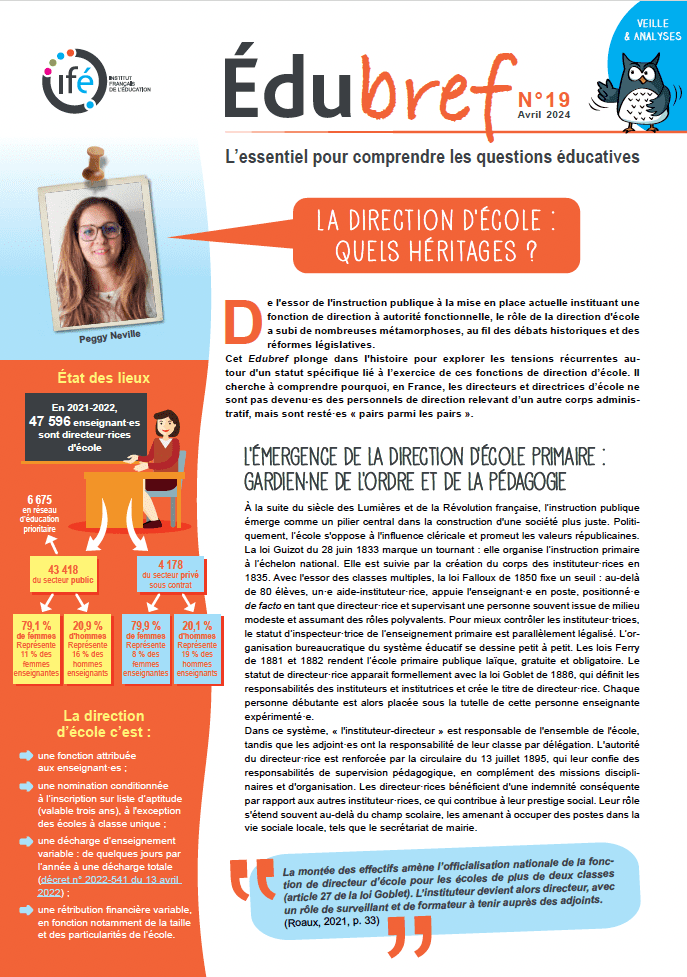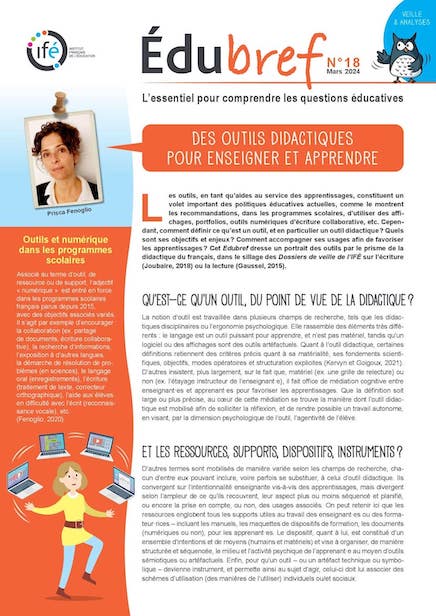Pays : France
Langue(s) : français
Auteur(s) : DELACOUR Gérard
Date de soutenance : 2010
Thèse délivrée par : Conservatoire national des arts et métiers
Section(s) CNU : section 70 : Sciences de l'éducation
Sous la direction de : Pierre PASTRE
Jury de thèse : ASTIER Philippe, VINATIER Isabelle, DURAND Marc, KADDOURI Mokhtar, VERGNAUD Gérard
« Apprendre comme Inventer, essai pour introduire le concept didactique d'insension. Apprendre est une activité, aussi bien au sens de « to teach », du point de vue de l’enseignant, apprendre comme enseigner, qu’au sens de « to learn », du point de vue de l’apprenant, c’est-à-dire apprendre comme connaître. L’analyse de l’activité par la Didactique professionnelle en tant qu’analyse de ce qui est productif et constructif dans l’action, peut s’appliquer à l’action d’apprendre. Or il existe, à côté de la conceptualisation dans l’action, des moments où le Sujet apprend en s’incorporant à lui-même la connaissance. Ce moment est un acte du Sujet par induction, c’est-à-dire par colligation d’éléments épars, perçus et/ou imaginés. Le Sujet accède ainsi au sens qu’il donne en acte à l’apprendre. Cette saisie du sens, ou « insension » est une invention du Sujet qui participe doublement à son développement : d’une part, les connaissances appropriées au Sujet par le Sujet engagent le développement de sa compétence, d’autre part, l’activité d’apprendre comme inventer est conjointe au développement identitaire du Sujet. Pour l’ingénierie didactique de formation, apprendre à enseigner demande l’écoute de la singularité du cadre de référence du Sujet. Pour faciliter à l’ignorant le passage à la connaissance, c’est-à-dire à l’incorporation des savoirs référencés, il faut que les dispositifs de formation aient pour point de départ la perspective de l’apprenant. Le Sujet ignorant est reconnu capable d’apprendre à partir de son cadre de référence, tel qu’il est, c’est-à-dire capable d’un acte d’incorporation pour soi des savoirs que l’insension (colligation) transforme en connaissances. Le Sujet peut alors accéder socialement à la reconnaissance de sa compétence. »
Abstract
Learning as Thinking Up
« Learning as Thinking Up, an introduction to the didactic concept of "insension". ”Apprendre” in French, is an activity, meaning both “to teach” from the point of view of the teacher, and “to learn” from the perspective of the student (hereafter referred to as the “Subject” or the “Uninitiated”). The activity’s analysis by Professional Didactic, that is to say an analysis of what is productive and constructive within an action, can be applied to “learning”. However, in attempting to understand the learning process, one recognizes that there do exist, along with the conceptualization within the action, times when the subject learns by self-incorporating knowledge. This is when the Subject reacts, by use of induction, that is to say by the colligation of scattered elements, as they are perceived and/or imagined. Thus, the Subject accesses to the meaning he or she gives to learning. This grasping of the meaning or "insension" is an invention of the Subject which participates in a double development: on the one hand, the knowledge appropriated to the Subject by the Subject, initiates his skills’ development, and on the other hand, the thinking up learning activity is linked to the development of the Subject’s identity. Educational training planning requires taking into account the Subject’s personal reference framework. In order to lead the Uninitiated towards “knowing”, that is to say, the incorporation of referenced knowledge, it is necessary that the training schemes have, as a starting point, the point of view of the Uninitiated. The Uninitiated is recognized as being able to learn from his or her personal reference framework, that is to say able to act on referenced knowledge for its self-incorporation. The insension (colligation) transforms it into personal knowledge. Therefore, the Subject accesses to social recognition of its skills. »
URL : http://www.theses.fr/2010CNAM0713/document
mot(s) clé(s) : didactiques disciplinaires, recherche en éducation
Apprendre comme Inventer
Auteur(s) : DELACOUR Gérard
Date de soutenance : 2010
Thèse délivrée par : Conservatoire national des arts et métiers
Section(s) CNU : section 70 : Sciences de l'éducation
Sous la direction de : Pierre PASTRE
Jury de thèse : ASTIER Philippe, VINATIER Isabelle, DURAND Marc, KADDOURI Mokhtar, VERGNAUD Gérard
« Apprendre comme Inventer, essai pour introduire le concept didactique d'insension. Apprendre est une activité, aussi bien au sens de « to teach », du point de vue de l’enseignant, apprendre comme enseigner, qu’au sens de « to learn », du point de vue de l’apprenant, c’est-à-dire apprendre comme connaître. L’analyse de l’activité par la Didactique professionnelle en tant qu’analyse de ce qui est productif et constructif dans l’action, peut s’appliquer à l’action d’apprendre. Or il existe, à côté de la conceptualisation dans l’action, des moments où le Sujet apprend en s’incorporant à lui-même la connaissance. Ce moment est un acte du Sujet par induction, c’est-à-dire par colligation d’éléments épars, perçus et/ou imaginés. Le Sujet accède ainsi au sens qu’il donne en acte à l’apprendre. Cette saisie du sens, ou « insension » est une invention du Sujet qui participe doublement à son développement : d’une part, les connaissances appropriées au Sujet par le Sujet engagent le développement de sa compétence, d’autre part, l’activité d’apprendre comme inventer est conjointe au développement identitaire du Sujet. Pour l’ingénierie didactique de formation, apprendre à enseigner demande l’écoute de la singularité du cadre de référence du Sujet. Pour faciliter à l’ignorant le passage à la connaissance, c’est-à-dire à l’incorporation des savoirs référencés, il faut que les dispositifs de formation aient pour point de départ la perspective de l’apprenant. Le Sujet ignorant est reconnu capable d’apprendre à partir de son cadre de référence, tel qu’il est, c’est-à-dire capable d’un acte d’incorporation pour soi des savoirs que l’insension (colligation) transforme en connaissances. Le Sujet peut alors accéder socialement à la reconnaissance de sa compétence. »
Abstract
Learning as Thinking Up
« Learning as Thinking Up, an introduction to the didactic concept of "insension". ”Apprendre” in French, is an activity, meaning both “to teach” from the point of view of the teacher, and “to learn” from the perspective of the student (hereafter referred to as the “Subject” or the “Uninitiated”). The activity’s analysis by Professional Didactic, that is to say an analysis of what is productive and constructive within an action, can be applied to “learning”. However, in attempting to understand the learning process, one recognizes that there do exist, along with the conceptualization within the action, times when the subject learns by self-incorporating knowledge. This is when the Subject reacts, by use of induction, that is to say by the colligation of scattered elements, as they are perceived and/or imagined. Thus, the Subject accesses to the meaning he or she gives to learning. This grasping of the meaning or "insension" is an invention of the Subject which participates in a double development: on the one hand, the knowledge appropriated to the Subject by the Subject, initiates his skills’ development, and on the other hand, the thinking up learning activity is linked to the development of the Subject’s identity. Educational training planning requires taking into account the Subject’s personal reference framework. In order to lead the Uninitiated towards “knowing”, that is to say, the incorporation of referenced knowledge, it is necessary that the training schemes have, as a starting point, the point of view of the Uninitiated. The Uninitiated is recognized as being able to learn from his or her personal reference framework, that is to say able to act on referenced knowledge for its self-incorporation. The insension (colligation) transforms it into personal knowledge. Therefore, the Subject accesses to social recognition of its skills. »
URL : http://www.theses.fr/2010CNAM0713/document
mot(s) clé(s) : didactiques disciplinaires, recherche en éducation















